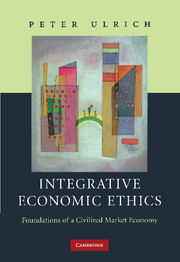Book contents
- Frontmatter
- Contents
- List of figures
- Preface
- Translator's note
- Introduction: orientation in economic-ethical thinking
- Part I Fundamental concepts of modern ethics and the approach of integrative economic ethics
- Part II Reflections on the foundations of economic ethics I: a critique of economism
- 4 ‘Inherent necessity’ of competition? A critique of economic determinism
- 5 ‘Morality’ of the market? A critique of economic reductionism
- Part III Reflections on the foundations of economic ethics II: rational economic activity and the lifeworld
- Part IV A topology of economic ethics: the ‘sites’ of morality in economic life
- Bibliography
- Index of subjects
- Index of names
5 - ‘Morality’ of the market? A critique of economic reductionism
Published online by Cambridge University Press: 22 September 2009
- Frontmatter
- Contents
- List of figures
- Preface
- Translator's note
- Introduction: orientation in economic-ethical thinking
- Part I Fundamental concepts of modern ethics and the approach of integrative economic ethics
- Part II Reflections on the foundations of economic ethics I: a critique of economism
- 4 ‘Inherent necessity’ of competition? A critique of economic determinism
- 5 ‘Morality’ of the market? A critique of economic reductionism
- Part III Reflections on the foundations of economic ethics II: rational economic activity and the lifeworld
- Part IV A topology of economic ethics: the ‘sites’ of morality in economic life
- Bibliography
- Index of subjects
- Index of names
Summary
The cunning of the market leads to an overall economic benefit and thus to a good end which definitely stands up moral evaluation.
Apart from economic determinism, according to which economic ethics seems systematically impossible (supposed Sachzwänge), there is a second, no less common objection that this endeavour is not only impossible but also systematically unnecessary and superfluous. Economic ethics is then passed off as being even damaging and dangerous, as it approaches in a moralizing fashion complex relationships which are best coordinated or should even be exclusively coordinated by the market itself. The anonymous functional logic of the competitive system is not then perceived as the problem but, on the contrary, as the solution of (almost) all ethical problems in society. The market itself is regarded as the best ‘guarantor’ that everything is in the best of order from an ethical point of view. If only it is allowed to function, the market mechanism seems to be the great harmonizer, reconciling the conflicting interests of society of its own accord. Adam Smith was the first to put his finger on this function of competition as a (partial) substitute for normative social integration in a famous statement still enormously popular among ‘liberal’ economists and economic practitioners:
It is not from the benevolence of the butcher, the brewer, or the baker that we expect our dinner, but from their regard to their own interest. We address ourselves, not to their humanity but to their self-love, and never talk to them of our own necessities, but of their advantages.
- Type
- Chapter
- Information
- Integrative Economic EthicsFoundations of a Civilized Market Economy, pp. 147 - 184Publisher: Cambridge University PressPrint publication year: 2008

